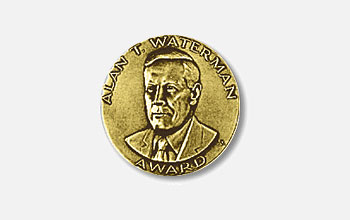News Release 17-037
National Science Foundation modifies Alan T. Waterman Award eligibility criteria
Change approved to draw more nominees, including women and underrepresented minorities
April 18, 2017
This material is available primarily for archival purposes. Telephone numbers or other contact information may be out of date; please see current contact information at media contacts.
The National Science Foundation (NSF) today announced changes in eligibility requirements for the Alan T. Waterman Award, which annually recognizes an outstanding young researcher in any field of science or engineering supported by NSF.
Scientists 40 years of age or younger, or up to 10 years post Ph.D., now may be nominated for the award. Previous requirements mandated nominees be 35 years or younger or up to seven years post Ph.D.
These new criteria take effect with the 2018 competition, which opens late summer 2017.
"The research world has changed, and NSF needs to be responsive and understanding to the change," said NSF Director France Córdova. "For various reasons, many delay their research pursuits until later years."
Other requirements have not changed. A candidate should have demonstrated, exceptional, individual achievement in scientific or engineering research of sufficient quality, originality, innovation and significant impact on the field so as to situate him or her as a leader among peers.
NSF requested the criteria be modified to increase the number of excellent and diverse applicants. NSF's National Science Board (NSB) approved the modifications in November 2016.
"This was motivated in part by community comments noting that only two women have won the Waterman award in the last 15 years. By allowing 'Ph.D. plus ten years' instead of 'plus 7' and moving from age 35 to 40, I think we are accounting for how much early research careers have changed since we last adjusted eligibility rules in 1999," said NSB Chair Maria Zuber.
NSF hopes that the change draws more nominees, including women and underrepresented minorities.
As the primary supporter of fundamental science and engineering research in the United States, NSF is committed to recognizing early career researchers at the forefront of their fields and to ensuring every excellent, young scientist has the opportunity to be nominated for the award.
Congress established the Alan T. Waterman Award in August 1975 to mark the 25th anniversary of NSF and to honor its first director.
In addition to a medal, the awardee receives a grant of $1 million distributed over five years for scientific research or advanced study in the mathematical, physical, biological, engineering, social or other sciences at the institution of the recipient's choice.
For more information, please see the Waterman Award fact sheet.
-NSF-
Media Contacts
Bobbie Mixon, NSF, (703) 292-8485, email: bmixon@nsf.gov
The U.S. National Science Foundation propels the nation forward by advancing fundamental research in all fields of science and engineering. NSF supports research and people by providing facilities, instruments and funding to support their ingenuity and sustain the U.S. as a global leader in research and innovation. With a fiscal year 2023 budget of $9.5 billion, NSF funds reach all 50 states through grants to nearly 2,000 colleges, universities and institutions. Each year, NSF receives more than 40,000 competitive proposals and makes about 11,000 new awards. Those awards include support for cooperative research with industry, Arctic and Antarctic research and operations, and U.S. participation in international scientific efforts.
Connect with us online
NSF website: nsf.gov
NSF News: nsf.gov/news
For News Media: nsf.gov/news/newsroom
Statistics: nsf.gov/statistics/
Awards database: nsf.gov/awardsearch/
Follow us on social
Twitter: twitter.com/NSF
Facebook: facebook.com/US.NSF
Instagram: instagram.com/nsfgov

